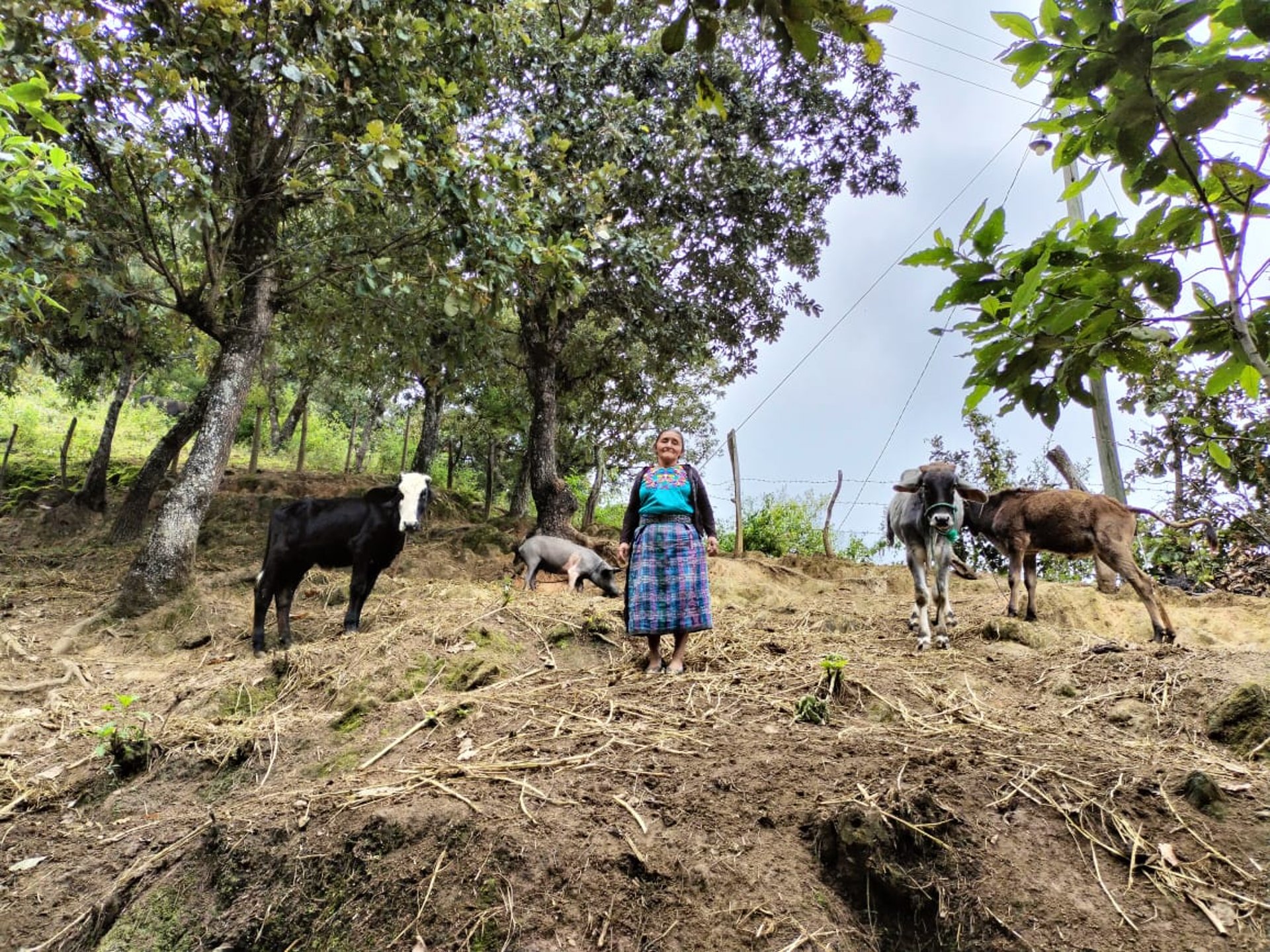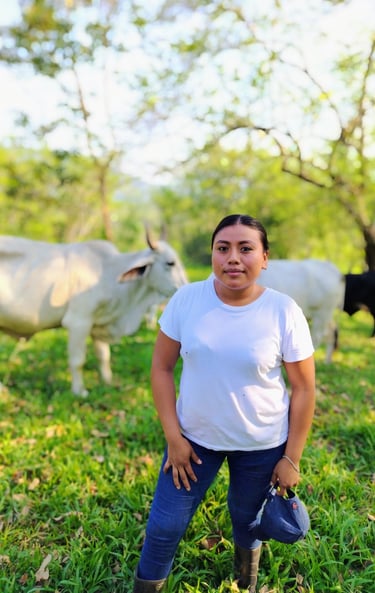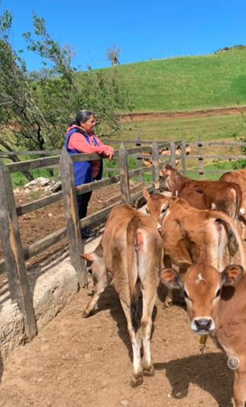
Voices from the Territory
Stories that inspire


"My dad broke the pattern" - The story of Josefina Méndez Gómez, a young cattle rancher from Salto de Agua, Chiapas (Indigenous Zone)
My name is Josefina Méndez Gómez, I am 23 years old and I live in the Cenobio Aguilar ejido, municipality of Salto de Agua, Chiapas. My family consists of my parents, Nicolás and Manuela, and my siblings Jonás and Martha Méndez Gómez. My father is dedicated to agriculture and cattle raising, we have 13 hectares, and my mother, besides being a housewife, takes care of the animals in the backyard.
My story begins when I was just 8 years old. Since then, my parents taught me what it was like to work in the fields, harvesting beans, squash and other crops. When I was 16 years old, my father started teaching me how to handle cattle: how to feed them, detect diseases, help with calving, and many other tasks. At that time, he was riding a horse and I was walking, but I didn't mind that, because for me it was an adventure. I loved accompanying him.
Little by little he taught me how to saddle, brush, bathe and tame a horse. He always told me that to ride you had to speak nicely to the animal, that it had to get used to my voice. I remember fondly my first fall while riding... I didn't say anything to my father, because he had sent me to the ranch alone, as a test. I didn't want to fail him.
When my dad got sick, the ranch was left under the responsibility of my brother Jonah. Seeing him take over our father's work, my sister Martha and I decided to help him. Together we focused on continuing the family work. Jonas taught us tasks such as planting posts, vaccinating and bathing cattle, spraying, applying vitamins and medicines, and even framing animals.
Eventually, Martha left to study for a degree, and I also had the opportunity to combine work with studies: I work during the week as a bilingual teacher, speak Chol and Spanish, and study on weekends for my master's degree. On holidays, I go back to the ranch. We have a mutual work agreement between the three siblings, a pact that was our parents' decision, and which we proudly honour to this day.
Thanks to my father breaking the pattern, I have learned about cattle breeding. He taught me that cattle breeding is not just for men. He opened the door for me to learn, grow and deeply love this way of life. Today, together with my brothers, I continue to raise cattle and carry on the teachings of my parents.


Martha Melgar: livestock tradition and leadership in times of change
Martha Amelia Melgar Cabrera de Ramírez, 58 years old, with three sons, Oscar, Fernando and Carlos, has a degree in Nutrition and has been managing the farm "La Primavera" for several years, with special emphasis on the production and commercialisation of dairy products.
Finca La Primavera has an area of 117 hectares, of which 60 hectares are forest and 42 hectares are used for livestock. On the farm there is a house occupied by the employees and their families. He spends 70% of his time on the farm and the other 30% is used for his commercial and trade activities. Her family has a tradition of livestock production, she belongs to the 4th generation and likes it, since her parents instilled in her a love for this activity since she was a child. After the death of her brother and her father, Martha dedicated herself 100% to managing the family farm.
In the management of the farm, her tasks are mainly focused on supervision, direction, planning, support in cleaning the dairy areas, as well as the implementation of new tasks according to the needs.
"The main source of income for the family comes from the production of milk, the sale of genetics, the sale of dairy products processed by us (cheese, cream, cottage cheese) and the financial support of my husband."
Of the most evident changes in the climate, she shares "the rainy season is no longer as marked as it used to be, where one used to say that winter began on 15 May and ended on 15 October, it is no longer constant, sometimes it rains very heavily and then there are several days without rain. The heat is stronger, more suffocating and affects grass growth or dries it out. Crops yield if there is a good winter (neither too strong nor too little). Crops have been lost or strong winds have blown down cornfields, or other. Heavy rains rot crops".
She points out that the most important effects on their livestock production are evident in "the decrease in the production of grass or milpa for silage, sometimes the expected yield is not achieved. This leads to the need to use more concentrates, which makes production more expensive. Also, when there are storms, there are problems with roads and it is difficult for the milk collector to arrive on the scheduled days. The problem of the roads also affects me personally when it comes to getting to the farm".
"Occasionally there is a need to change the rotation of the paddocks, looking for the safest areas for the cattle. The cattle, when there is a lot of rain, get sick recently and diseases such as foot rot appear and production decreases. There is a greater likelihood of mastitis, somatic cells increase, which means that the price we are paid decreases."
To cope with this climatic variability, She has looked for alternative areas for fodder production or cornfields to make silos. To change the rotation of paddocks so that the cattle are in safe areas and to ensure the cows' comfort.
"I started more directly when my brother died in the middle of tropical storm Agatha, and my father was in poor health. The pity was that the workers were not going to accept my direction, but thank God that was not the case. Then my father passed away when I was three years old, but I had the opportunity that during that time he taught me more closely what I had to do, he guided me to make decisions and to solve everyday problems. At the same time, I had the support of my mother, who was always by my father's side and together they solved the problems that needed to be solved, and she was also a guide. Apart from the work on the farm, some of the neighbours assumed that the farm would end, that as women we would not be able to get ahead (there was only my mother and 3 sisters left), but thanks to God we are still standing with the farm, its work and production".
Since 2021 she has been a member of the board of directors of the Guatemalan Jersey Cattle Breeders Association, as vice-president. Then in 2022 as president, and there is a bit of mistrust in the reception of her proposals, by some of the associates; however, the expected results are always obtained "this year has been the most difficult in this area, but I hope to move forward" she says.
She was part of the board of directors of the Chamber of Milk Producers, CPLG, as member III, in the period 2022-2024; she was part of the board of directors of the Federation of Cattle Breeders of Guatemala (FEGAGUATE), as secretary in the period 2022-2024 and continues as secretary for the period 2025-2027. She is also a member of the board of directors of Cooproleche, as treasurer for the period 2025-2027.
